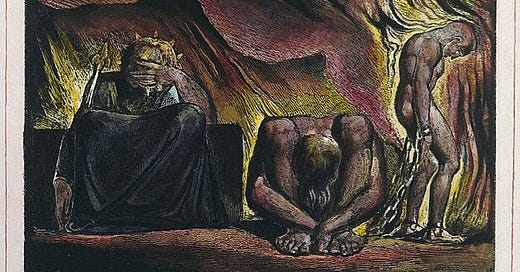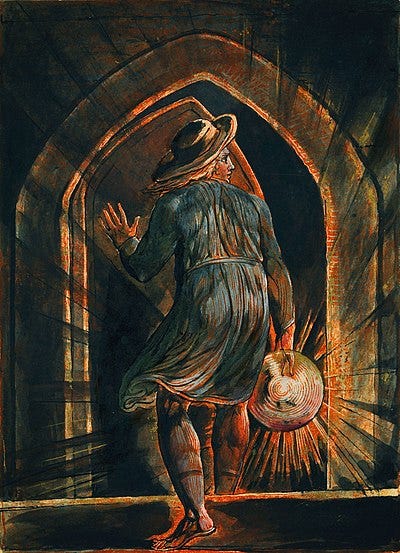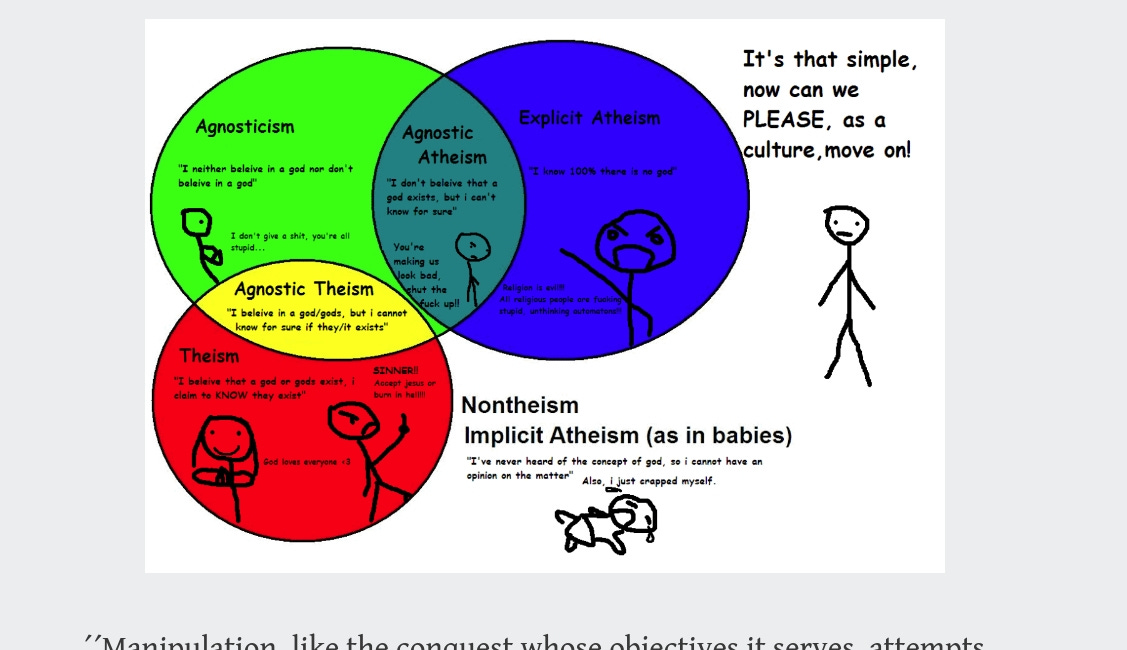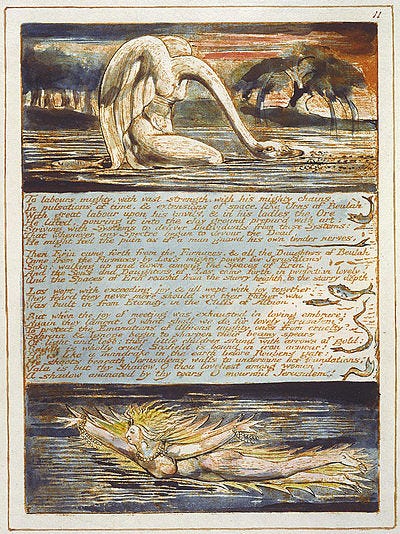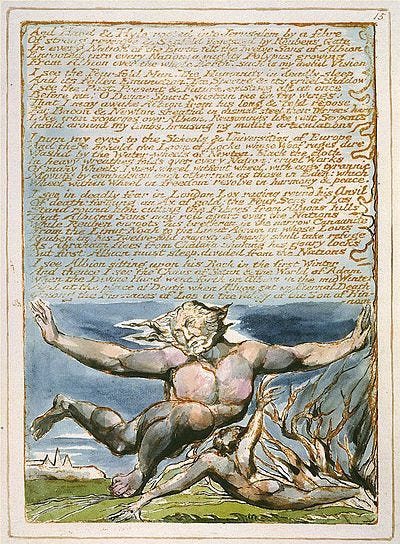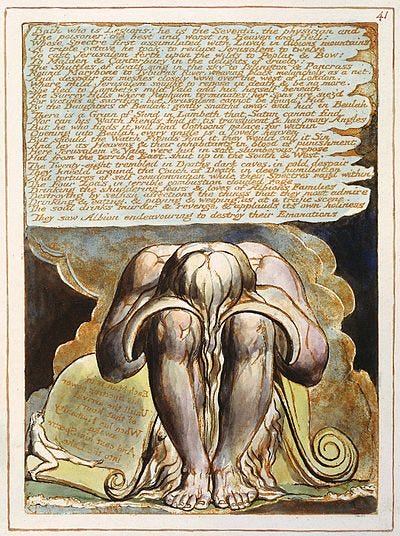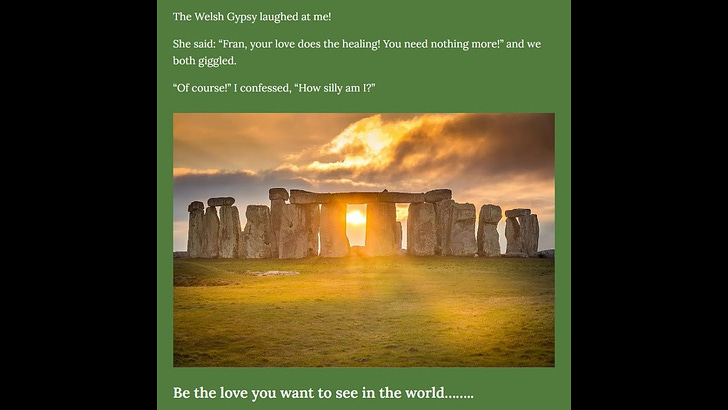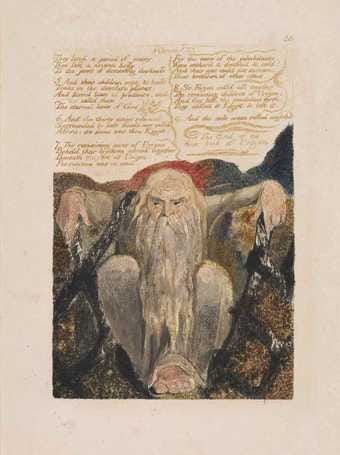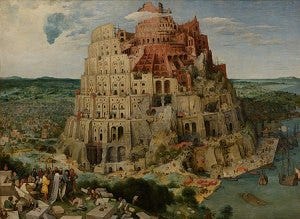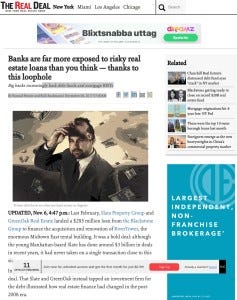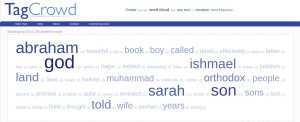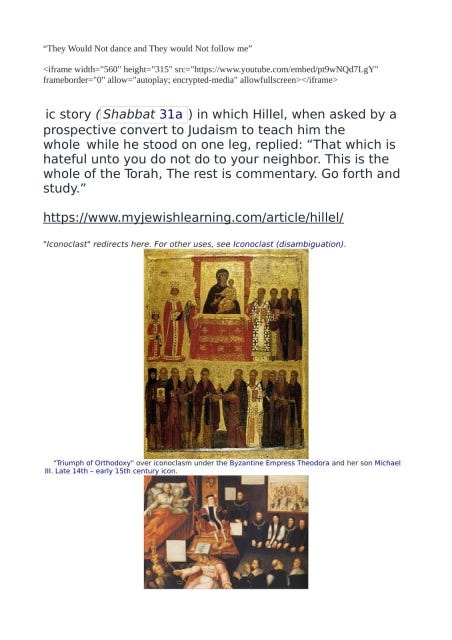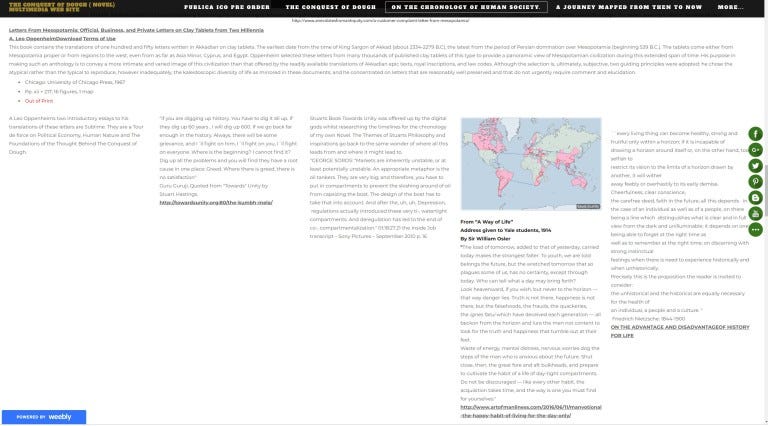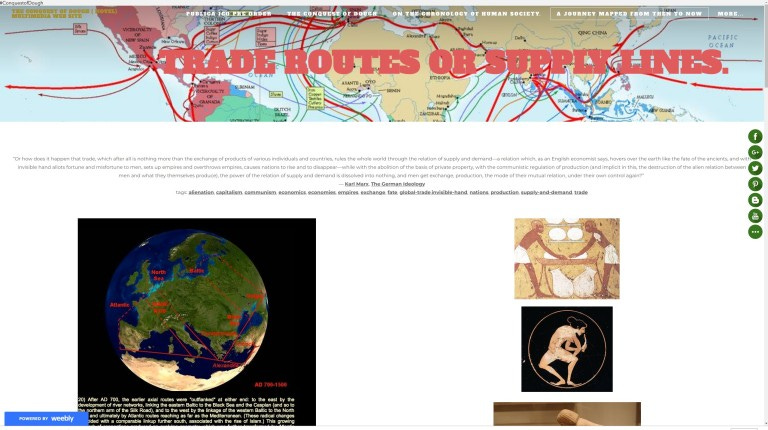For a Tear is an Intellectual thing. William Blake
The Return of Israel is a Return to Mental Sacrifice & War. Take up the Cross O Israel & follow Jesus.
William Blake's poem "For a tear is an intellectual Thing" delves into the themes of conflict, spirituality, and the enduring impact of violence. Through vivid imagery and thought-provoking symbolism, the poem challenges us to reflect on human nature and the pursuit of peace amidst societal challenges. Blake's words serve as a timeless reminder of the power of art to illuminate the human experience and inspire introspection.
Detailed Summary for [For a tear is an intellectual Thing, William Blake]
<iframe width="560" height="315" src="
title="YouTube video player" frameborder="0" allow="accelerometer; autoplay; clipboard-write; encrypted-media; gyroscope; picture-in-picture; web-share" referrerpolicy="strict-origin-when-cross-origin" allowfullscreen></iframe>
by [Monica](https://monica.im
[00:02](
Reading William Blake's poem 'For a tear is an intellectual thing'
- William Blake's poem explores the concept of tears as intellectual}
- The poem depicts a monk rising in a scene of war and sacrifice}
- A tear is seen as an intellectual thing, while a sigh is the sword of an Angel king}
[03:09](
William Blake's poem discusses the betrayal of natural morality and religion.
- He never can be a friend to the human race who is the preacher of natural morality or natural religion.}
- Man is born a spectre or Satan and requires continual change into his direct contrary.}
- William Blake's work emphasizes spirituality and looking within.}
- The bond between humankind and the Creator is explored.}
[06:26](
Discussing the worship of Satan under the name of God
- Satan worship disguised as God's worship}
- Differentiating religions based on vengeance or forgiveness}
- Deism as the worship of the God of this world}
- Exploring seemingly contradictory thoughts about Pelagius}
[09:38](
Discussion on sin, virtue, and forgiveness
- Whitefield confessed his sins openly}
- Friendship requires forgiveness of sins}
- Religion of Jesus emphasizes forgiveness of sin}
- The glory of Christianity lies in forgiveness}
[12:52](
Exploration of power, resistance, and consequences of human actions in conflict
- Striking portrayal of conflict and its toll}
- Enduring impact of violence and struggle for peace}
- Blending of epochs underscores timeless nature of human conflict}
- Interconnectedness of human experience and divine presence}
[16:03](
The video discusses the repair and beautification of a city
- The city was in a ruinous condition due to neglect by magistrates}
- Provided for education, maintenance, and public entertainment}
- Description of an archway in William Blake's work}
- Inspired the long sufferings of God for Albian's sake}
The video discusses William Blake's poetry on love, forgiveness, and divine visions, exploring themes of imagination, forgiveness, and the struggle between contraries in understanding the world.
Detailed Summary for [For a Tear is an Intellectual thing. William Blake Part 2](
by [Monica](https://monica.im)
[00:00](
Reading of William Blake's poetry on the theme of spiritual awakening and divine love
- Awake, awake, O sleeper of the land of shadows, wake, expand. I am in you and you in me, mutual in love divine.}
- Weep at thy soul's disease, and the divine vision is darkened.}
- And thus the spectre spoke. Wilt thou still go on to destruction, till thy life is all taken away by this deceitful friendship?}
- Because of deceit and friendship, for low hand has peopled Babel and Nineveh.}
[05:21](
Exploring the symbolism of Loss in William Blake's mythology
- Loss represents the imagination and corresponds to the loving and forgiving Christ of the New Testament}
- Blake sees Loss crafting objects from molten metal, as he himself forged his visions and inspirations into poetry and art}
[10:42](
Albion's encounter with Lost and the demand for righteousness and justice
- Albion sitting upon his rock in the first winter, facing chaos of Satan and Adam's world}
- Albion speaks of righteousness, justice, and mercy in a dream encounter with Lost}
[16:03](
The dead lament and curse Albion, seeking glory and victory
- The dead cry out from the deeps, beneath upon the hills of Albion, Oxford groans in his}
- Come up, build Babylon, Rahab is yours, and all her multitudes with her, in pomp and glory}
- Thus mourn they, loud the furnaces of lost thunder upon the clouds of Europe and Asia}
- And lost prayed and said, oh divine saviour arise, upon the mountains of Albion as in}
[21:24](
The creation of Albion and Jerusalem's pillars
- Albion was the parent of the Druids}
- The fields from Islington Marleybone to Primrose Hill and St. John's Wood were builded over with pillars of gold}
- She walks upon our meadows green, the Lamb of God walks by her side}
- What are those golden builders doing near mournful ever-weeping Paddington}
[26:45](
The rise of a new imperial system and its impact on the Middle East
- International forces aim to establish a new imperial system rivaling the Roman Empire.}
- Arab world aligns with Russia, fostering hatred towards Israelis.}
- Arab world and Russia plan to invade Israel, leading to a global crisis.}
- Elite face pressure, internal conflicts, and economic chaos due to Middle East war.}
[32:06](
Understanding the significance of contraries in creativity
- Poetry to discover one's creative imagination.}
- Introducing Blake's poem Jerusalem}
- Quotation from the Bible regarding prophets}
- Explanation of William Blake's characters}
[37:27](
Discussing the Western tradition and human nature
- David Graeber described the underside of the Western tradition}
- Exploring the question of free will or determinism and human nature assumptions}
- Examining human psychology and the concept of ego}
title="YouTube video player" frameborder="0" allow="accelerometer; autoplay; clipboard-write; encrypted-media; gyroscope; picture-in-picture; web-share" referrerpolicy="strict-origin-when-cross-origin" allowfullscreen></iframe>
The Monk
I saw a Monk of Charlemaine t
Arise before my sight
I talkd with the Grey Monk as we stood t
In beams of infernal light
Gibbon arose with a lash of steel t 5
And Voltaire with a wracking wheel
The Schools in clouds of learning rolld t
Arose with War in iron & gold.
Thou lazy Monk they sound afar t
In vain condemning glorious War t 10
And in your Cell you shall ever dwell t
Rise War & bind him in his Cell.
The blood. red ran from the Grey Monks side
His hands & feet were wounded wide
His body bent, his arms & knees 15
Like to the roots of ancient trees
When Satan first the black bow bent t
And the Moral Law from the Gospel rent
He forgd the Law into a Sword
And spilld the blood of mercys Lord. 20
Titus! Constantine! Charlemaine! t
O Voltaire! Rousseau! Gibbon! Vain
Your Grecian Mocks & Roman Sword t
Against this image of his Lord!
For a Tear is an Intellectual thing; t 25
And a Sigh is the Sword of an Angel King
And the bitter groan of a Martyrs woe t
Is an Arrow from the Almighties Bow!
Chat GPT Generated.
He never can be a Friend to the Human Race who is the Preacher of Natural Morality or Natural Religion. he is a flatterer who means to betray, to perpetuate Tyrant Pride & the Laws of that Babylon which he foresees shall shortly be destroyed, with the Spiritual and not the Natural Sword: He is in the State named Rahab: which State must be put off before he can be the Friend of Man.
You O Deists profess yourselves the Enemies of Christianity: and you are so: you are also the Enemies of the Human Race & of Universal Nature. Man is born a Spectre or Satan & is altogether an Evil, & requires a New Selfhood continually & must continually be changed into his direct Contrary. But your Greek Philosophy (which is a remnant of Druidism) teaches that Man is Righteous in his Vegetated Spectre: an Opinion of fatal & accursed consequence to Man, as the Ancients saw plainly by Revelation to the intire abrogation of Experimental Theory. and many believed what they saw, and Prophecied of Jesus.
Man must & will have Some Religion; if he has not the Religion of Jesus, he will have the Religion of Satan, & will erect the Synagogue of Satan. calling the Prince of this World, God; and destroying all who do not worship Satan under the Name of God. Will any one say: Where are those who worship Satan under the Name of God! Where are they? Listen! Every Religion that Preaches Vengeance for Sins the Religion of the Enemy & Avenger; and not the Forgiver of Sin, and their God is Satan, Named by the Divine Name Your Religion O Deists: Deism, is the Worship of the God of this World by the means of what you call Natural Religion and Natural Philosophy, and of Natural Morality or Self-Righteousness, the Selfish Virtues of the Natural Heart. This was the Religion of the Pharisees who murderd Jesus. Deism is the same & ends in the same.
Voltaire Rousseau Gibbon Hume. charge the Spiritually Religious with Hypocrisy! but how a Monk or a Methodist either, can be a Hypocrite: I cannot concieve. We are Men of like passions with others & pretend not to be holier than others: therefore, when a Religious Man falls into Sin, he ought not to be calld a Hypocrite: this title is more properly to be given to a Player who falls into Sin; whose profession is Virtue & Morality & the making Men Self-Righteous. Foote in calling Whitefield, Hypocrite: was himself one: for Whitefield pretended not to be holier than others: but confessed his Sins before all the World; Voltaire! Rousseau! You cannot escape my charge that you are Pharisees & Hypocrites, for you are constantly talking of the Virtues of the Human Heart, and particularly of your own, that you may accuse others & especially the Religious, whose errors, you by this display of pretended Virtue, chiefly design to expose. Rousseau thought Men Good by Nature; he found them Evil & found no friend. Friendship cannot exist without Forgiveness of Sins continually. The Book written by Rousseau calld his Confessions is an apology & cloke for his sin & not a confession.
But you also charge the poor Monks & Religious with being the causes of War: while you acquit & flatter the Alexanders & Caesars, the Lewis's & Fredericks: who alone are its causes & its actors. But the Religion of Jesus, Forgiveness of Sin, can never be the cause of a War nor of a single Martyrdom.
Those who Martyr others or who cause War are Deists, but never can be Forgivers of Sin. The Glory of Christianity is, To Conquer by Forgiveness. All the Destruction therefore, Christian Europe has arisen from Deism, which is Natural Religion.
In the vivid verses of William Blake's poem, "The Grey Monk," we are transported to a scene where historical and literary figures come to life in a tumultuous display of conflict and defiance. The imagery evoked by Blake's words is rich with symbolism and depth, inviting us to contemplate the timeless themes of war, morality, and the human condition.
The poem opens with the speaker recounting an encounter with a Monk of Charlemaine, a figure from the era of the medieval emperor. The Monk, depicted as rising in infernal light, engages in a dialogue with the Grey Monk, leading to a confrontation that brings forth the spirits of Gibbon and Voltaire, accompanied by the embodiment of war in iron and gold. This dramatic tableau sets the stage for a profound exploration of power, resistance, and the consequences of human actions.
As the verses unfold, we witness a striking portrayal of conflict and its toll on the Grey Monk, whose body bears the wounds of battle. The imagery of blood running from his side and his form resembling the roots of ancient trees serves as a poignant reminder of the physical and spiritual scars inflicted by war. Through these evocative descriptions, Blake invites us to confront the enduring impact of violence and the enduring struggle for peace and redemption.
The poem takes an unexpected turn as it delves into theological and historical references, invoking Satan's defiance of the moral law and the shedding of "mercys Lord" blood. The names of Titus, Constantine, and Charlemaine are invoked alongside Voltaire, Rousseau, and Gibbon, creating a juxtaposition of ancient and Enlightenment figures. This blending of epochs underscores the timeless nature of human conflict and the perennial quest for meaning and justice.
Amidst this tapestry of imagery and allusions, Blake introduces a profound insight into the nature of human emotion and spiritual significance. The lines "For a Tear is an Intellectual thing; And a Sigh is the Sword of an Angel King" resonate with a profound understanding of the interconnectedness of human experience and divine presence. The juxtaposition of tears and sighs with intellectual and angelic symbolism underscores the depth of human emotion and its transcendent qualities.
In contemplating Blake's "The Grey Monk," we are compelled to consider the enduring relevance of its themes in our contemporary world. The portrayal of conflict, suffering, and spiritual resistance speaks to universal truths that transcend time and place. Through its vivid imagery and thought-provoking symbolism, the poem challenges us to reflect on the complexities of human nature and the pursuit of peace amidst turmoil.
As we navigate our own societal challenges and personal struggles, Blake's words serve as a timeless reminder of the enduring power of art to illuminate the human experience. "The Grey Monk" stands as a testament to the enduring relevance of poetry in capturing the complexities of our world and inspiring contemplation and introspection.
In conclusion, William Blake's "The Grey Monk" offers a compelling exploration of war, spirituality, and human resilience. Through its vivid imagery, historical allusions, and profound insights, the poem transcends its era to speak to audiences across time. In contemplating its themes, we are invited to engage with fundamental questions about the nature of conflict, the pursuit of peace, and the enduring power of artistic expression.
‘I found the city in a ruinous condition, owing to the neglect of the magistrates, who had commonly been guilty of embezzlement, if not of wholesale plunder. I repaired the evil by means of aqueducts, beautified the city with noble buildings, and surrounded it with walls. The public revenues were easily increased by proper attention on the part of the fiscal authorities. I provided for the education of the young and the maintenance of the old; and for the general public I had games and spectacles, banquets and doles. As for rape and seduction, tyrannical violence or intimidation, I abhorred the very name of such things.”
https://lucianofsamosata.info/PhalarisI.html
[Frontispiece][1]
[Above the archway:]
There is a Void, outside of Existence, which if enterd into
Englobes itself & becomes a Womb, such was Albions Couch
A pleasant Shadow of Repose calld Albions lovely Land
His Sublime & Pathos become Two Rocks fixd in the Earth
5His Reason his Spectrous Power, covers them above
Jerusalem his Emanation is a Stone laying beneath
O [Albion behold Pitying] behold the Vision of Albion
[On right side of archway:]
Half Friendship is the bitterest Enmity said Los
As he enterd the Door of Death for Albions sake Inspired
10The long sufferings of God are not for ever there is a Judgment
[On left side, in reversed writing:]
Every Thing has its Vermin O Spectre of the Sleeping Dead![Frontispiece][1]
<iframe width="560" height="315" src="
title="YouTube video player" frameborder="0" allow="accelerometer; autoplay; clipboard-write; encrypted-media; gyroscope; picture-in-picture; web-share" referrerpolicy="strict-origin-when-cross-origin" allowfullscreen></iframe>
Awake! awake O sleeper of the land of shadows, wake! expand! I am in you and you in me, mutual in love divine: Fibres of love from man to man thro Albions pleasant land. In all the dark Atlantic vale down from the hills of Surrey 10 A black water accumulates, return Albion! return! Thy brethren call thee, and thy fathers, and thy sons, Thy nurses and thy mothers, thy sisters and thy daughters Weep at thy souls disease, and the Divine Vision is darkend: Thy Emanation that was wont to play before thy face, 15 Beaming forth with her daughters into the Divine bosom [Where!!] Where hast thou hidden thy Emanation lovely Jerusalem From the vision and fruition of the Holy-one? I am not a God afar off, I am a brother and friend; Within your bosoms I reside, and you reside in me: 20 Lo! we are One; forgiving all Evil; Not seeking recompense! Ye are my members O ye sleepers of Beulah, land of shades!
https://en.wikisource.org/wiki/Jerusalem._The_Emanation_of_the_Giant_Albion/Plate_4
Doing the wrong thing righter
http://tomchance.org/2024/05/09/until-planners-are-kings/ "Is there a true, or ideal, form of urban and rural development? Imagine, for a moment that there were. Who would we want in charge of seeking that truth, and governing on the basis of their ruminations?
And thus the Spectre spoke: Wilt thou still go on to destruction? 10 Till thy life is all taken away by this deceitful Friendship? He drinks thee up like water! like wine he pours thee Into his tuns: thy Daughters are trodden in his vintage He makes thy Sons the trampling of his bulls, they are plow'd And harrowd for his profit, lo! thy stolen Emanation Is his garden of pleasure! 15 all the Spectres of his Sons mock thee Look how they scorn thy once admired palaces! now in ruins Because of Albion! because of deceit and friendship! For Lo! Hand has peopled Babel & Nineveh: Hyle, Ashur & Aram: Cobans son is Nimrod: his son Cush is adjoind to Aram, 20 By the Daughter of Babel, in a woven mantle of pestilence & war. They put forth their spectrous cloudy sails; which drive their immense Constellations over the deadly deeps of indefinite Udan-Adan Kox is the Father of Shem & Ham & Japheth, he is the Noah Of the Flood of Udan-Adan. Hutn is the Father of the Seven From Enoch to Adam 25 ; Schofield is Adam who was New-Created in Edom. I saw it indignant, & thou art not moved! This has divided thee in sunder: and wilt thou still forgive? O! thou seest not what I see! what is done in the Furnaces. Listen, I will tell thee what is done in moments to thee unknown: 30 Luvah was cast into the Furnaces of affliction and sealed,And Vala fed in cruel delight, the Furnaces with fire:
https://en.wikisource.org/wiki/Jerusalem._The_Emanation_of_the_Giant_Albion/Plate_7
Therefore Los stands in London building Golgonooza
—Compelling his Spectre to labours mighty;
trembling in fear The Spectre weeps,
but Los unmovd by tears or threats remains
20
I must Create a System, or be enslav'd by another Mans
I will not Reason & Compare: my business is to Create
So Los, in fury & strength: in indignation & burning wrath
Shuddring the Spectre howls.
his howlings terrify the night
He stamps around the Anvil, beating blows of stern despair
25
He curses Heaven & Earth, Day & Night & Sun & Moon
He curses Forest Spring & River, Desart & sandy Waste
Cities & Nations, Families & Peoples, Tongues & Laws
Driven to desperation by Los's terrors & threatning fears
https://en.wikisource.org/wiki/Jerusalem._The_Emanation_of_the_Giant_Albion/Plate_10
https://en.wikisource.org/wiki/Jerusalem._The_Emanation_of_the_Giant_Albion/Plate_11
What are those golden builders doing? where was the burying-place Of soft Ethinthus? near Tyburns fatal Tree? is thatMild Zions hills most ancient promontory; near mournful Ever weeping Paddington? is that Calvary and Golgotha? Becoming a building of pity and compassion? 30 Lo! The stones are pity, and the bricks, well wrought affections: Enameld with love & kindness, & the tiles engraven gold Labour of merciful hands: the beams & rafters are forgiveness: The mortar & cement of the work, tears of honesty: the nails,And the screws & iron braces, are well wrought blandishments, 35 And well contrived words, firm fixing, never forgotten, Always comforting the remembrance: the floors, humility, The cielings, devotion: the hearths, thanksgiving: Prepare the furniture O Lambeth in thy pitying looms! The curtains, woven tears & sighs, wrought into lovely forms 40 For comfort. there the secret furniture of Jerusalems chamberIs wrought: Lambeth! the Bride the Lambs Wife loveth thee: Thou art one with her & knowest not of self in thy supreme joy. Go on, builders in hope: tho Jerusalem wanders far away, Without the gate of Los: among the dark Satanic wheels.
LOS
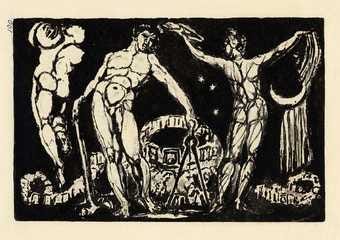
This picture, the 100th and final plate from Jerusalem, shows Los (the middle figure) in the pose of the Apollo Belvedere. He is holding a hammer in his right hand, and a pair of tongs in his left.
In Blake’s mythology Los represents the imagination, and corresponds to the loving and forgiving Christ of the New Testament. (As opposed to Urizen who, according to Blake, is the vengeful and repressive God of the Old Testament). Los often appears as a blacksmith with the tools of his trade. Blake sees Los crafting objects from molten metal, as he himself forged his visions and inspirations into poetry and art.
The name ‘Los’ may derive from the word ‘loss’, alluding to fallen man’s having ‘lost’ Paradise. It may, however, be a reversal of the Latin word ‘Sol’ (sun), since Los is shown creating the sun on plate 73 of Jerusalem. On the right of the picture is Enitharmon, Los’s wife. To Blake, she represents misguided religion based on chastity and vengeance. Their child is Orc, the symbol of revolution.
https://en.wikisource.org/wiki/Jerusalem._The_Emanation_of_the_Giant_Albion/Plate_12
And Hand & Hyle rooted into Jerusalem by a fibre Of strong revenge & Skofeld Vegetated by Reubens Gate In every Nation of the Earth till the Twelve Sons of Albion Enrooted into every Nation: a mighty Polypus growing From Albion over the whole Earth: 5 such is my awful Vision.I see the Four-fold Man. The Humanity in deadly sleep And its fallen Emanation. The Spectre & its cruel Shadow. I see the Past, Present & Future, existing all at once Before me; O Divine Spirit sustain me on thy wings! 10 That I may awake Albion from His long & cold repose. For Bacon & Newton sheathd in dismal steel, their terrors hang Like iron scourges over Albion, Reasonings like vast Serpents Infold around my limbs, bruising my minute articulations I turn my eyes to the Schools & Universities of Europe 15 And there behold the Loom of Locke whose Woof rages dire Washd by the Water-wheels of Newton. black the cloth In heavy wreathes folds over every Nation; cruel Works Of many Wheels I View, wheel without wheel, with cogs tyrannic Moving by compulsion each other: not as those in Eden: which Wheel within Wheel in freedom revolve in harmony & peace. 20 I see in deadly fear in London Los raging round his Anvil Of death: forming an Ax of gold: the Four Sons of Los Stand round him cutting the Fibres from Albions hills That Albions Sons may roll apart over the Nations 25 While Reuben enroots his brethren in the narrow Canaanite From the Limit Noah to the Limit Abram in whose Loins Reuben in his Twelve-fold majesty & beauty shall take refuge As Abraham flees from Chaldea shaking his goary locks But first Albion must sleep, divided from the Nations 30 I see Albion sitting upon his Rock in the first Winter And thence I see the Chaos of Satan & the World of Adam When the Divine Hand went forth on Albion in the mid Winter And at the place of Death when Albion sat in Eternal Death Among the Furnaces of Los in the Valley of the Son of Hinnom
https://en.wikisource.org/wiki/Jerusalem._The_Emanation_of_the_Giant_Albion/Plate_15
There is a Grain of Sand in Lambeth that Satan cannot find Nor can his Watch Fiends find it: tis translucent & has many Angles But he who finds it will find Oothoons palace, for within Opening into Beulah every angle is a lovely heaven But should the Watch Fiends find it, they would call it Sin 20 And lay its Heavens & their inhabitants in blood of punishment Here Jerusalem & Vala were hid in soft slumberous repose Hid from the terrible East, shut up in the South & West.
William Blake Meets Thomas Paine - Encounters
Albion spoke in his dismal dreams: O thou deceitful friend10Worshipping mercy & beholding thy friend in such affliction:Los! thou now discoverest thy turpitude to the heavens.I demand righteousness & justice. O thou ingratitude!Give me my Emanations back[,] food for my dying soul!My daughters are harlots! my sons are accursed before me.15Enitharmon is my daughter: accursed with a fathers curse!O! I have utterly been wasted! I have given my daughters to devils
So spoke Albion in gloomy majesty, and deepest nightOf Ulro rolld round his skirts from Dover to Cornwall.
Los answerd. Righteousness & justice I give thee in return20For thy righteousness! but I add mercy also, and bindThee from destroying these little ones: am I to be onlyMerciful to thee and cruel to all that thou hatest[?]Thou wast the Image of God surrounded by the Four Zoa'sThree thou hast slain! I am the Fourth: thou canst not destroy me.25Thou art in Error; trouble me not with thy righteousness.I have innocence to defend and ignorance to instruct:I have no time for seeming; and little arts of compliment,In morality and virtue: in self-glorying and pride.There is a limit of Opakeness, and a limit of Contraction;30In every Individual Man, and the limit of Opakeness,Is named Satan: and the limit of Contraction is named Adam.But when Man sleeps in Beulah, the Saviour in mercy takesContractions Limit, and of the Limit he forms Woman: ThatHimself may in process of time be born Man to redeem35But there is no Limit of Expansion! there is no Limit of Translucence.In the bosom of Man for ever from eternity to eternity.Therefore I break thy bonds of righteousness; I crush thy messengers!That they may not crush me and mine: do thou be righteous,And I will return it; otherwise I defy thy worst revenge:
40Consider me as thine enemy: on me turn all thy furyBut destroy not these little ones, nor mock the Lords anointed:Destroy not by Moral Virtue, the little ones whom he hath chosen!The little ones whom he hath chosen in preference to thee.He hath cast thee off for ever; the little ones he hath anointed!45Thy Selfhood is for ever accursed from the Divine presenceSo Los spoke: then turn'd his face & wept for Albion.
Albion replied. Go! Hand & Hyle! sieze the abhorred friend:As you Have siezd the Twenty-four rebellious ingratitudes;To atone for you, for spiritual death! Man lives by deaths of Men50Bring him to justice before heaven here upon London stone,Between Blackheath & Hounslow, between Norwood & FinchleyAll that they have is mine: from my free genrous gift,They now hold all they have: ingratitude to me!To me their benefactor calls aloud for vengeance deep.
55Los stood before his Furnaces awaiting the fury of the Dead:And the Divine hand was upon him, strengthening him mightily.
The Spectres of the Dead cry out from the deeps beneathUpon the hills of Albion; Oxford groans in his iron furnaceWinchester in his den & cavern; they lament against60Albion: they curse their human kindness & affectionThey rage like wild beasts in the forests of afflictionIn the dreams of Ulro they repent of their human kindness.
Come up, build Babylon, Rahab is ours & all her multitudesWith her in pomp and glory of victory. Depart65Ye twenty-four into the deeps! let us depart to glory!Their Human majestic forms sit up upon their CouchesOf death: they curb their Spectres as with iron curbsThey enquire after Jerusalem in the regions of the dead,With the voices of dead men, low, scarcely articulate,70And with tears cold on their cheeks they weary repose.O when shall the morning of the grave appear, and whenShall our salvation come? we sleep upon our watchWe cannot awake! and our Spectres rage in the forestsO God of Albion where art thou! pity the watchers!
75Thus mourn they. Loud the Furnaces of Los thunder uponThe clouds of Europe & Asia, among the Serpent Temples!
And Los drew his Seven Furnaces around Albions AltarsAnd as Albion built his frozen Altars, Los built the Mundane Shell,In the Four Regions of Humanity East & West & North & South,
80Till Norwood & Finchley & Blackheath & Hounslow, coverd the whole Earth.This is the Net & Veil of Vala, among the Souls of the Dead.
And Los prayed and said. O Divine Saviour arise Upon the Mountains of Albion as in ancient time. Behold! The Cities of Albion seek thy face, London groans in pain From Hill to Hill & the Thames laments along the Valleys 25 The little Villages of Middlesex & Surrey hunger & thirst The Twenty-eight Cities of Albion stretch their hands to thee: Because of the Opressors of Albion in every City & Village: They mock at the Labourers limbs! they mock at his starvd Children. They buy his Daughters that they may have power to sell his Sons: 30 They compell the Poor to live upon a crust of bread by soft mild arts: They reduce the Man to want: then give with pomp & ceremony. The praise of Jehovah is chaunted from lips of hunger & thirst! Humanity knows not of Sex: wherefore are Sexes in Beulah? In Beulah the Female lets down her beautiful Tabernacle; 35 Which the Male enters magnificent between her Cherubim: And becomes One with her mingling condensing in Self-love The Rocky Law of Condemnation & double Generation, & Death.
Albion hath enterd the Loins the place of the Last Judgment:And Luvah hath drawn the Curtains around Albion in Vala's bosom40The Dead awake to Generation! Arise O Lord, & rend the Veil!
So Los in lamentations followd Albion,
WILLIAM BLAKE EUROPE A PROPHESY AND BOODICA SPEAKS TO THE NWO
March 24, 2024 WILLIAM BLAKE EUROPE A PROPHESY AND BOODICA SPEAKS TO THE NWO https://rumble.com/v4ldjnc-william-blake-europe-a-prophesy-and-boodica-speaks-to-the-nwo.html Low Res on youtube, processing the longer one I did yesterday, I will continue to work on this over the next few months.
https://en.wikisource.org/wiki/Jerusalem._The_Emanation_of_the_Giant_Albion/To_the_Jews
To the Jews
Jerusalem the Emanation of the Giant Albion! Can it be? Is it a Truth that the Learned have explored? Was Britain the Primitive Seat of the Patriarchal Religion? If it is true: my title-page is also True, that Jerusalem was & is the Emanation of the Giant Albion. It is True, and cannot be controverted. Ye are united O ye Inhabitants of Earth in One Religion. The Religion of Jesus: the most Ancient, the Eternal: & the Everlasting Gospel—The Wicked will turn it to Wickedness, the Righteous to Righteousness. Amen! Huzza! Selah!
“All things Begin & End in Albions Ancient Druid Rocky Shore.”
Your Ancestors derived their origin from Abraham, Heber, Shem and Noah, who were Druids: as the Druid Temples (which are the Patriarchal Pillars & Oak Groves) over the whole Earth witness to this day.
You have a tradition, that Man anciently containd in his mighty limbs all things in Heaven & Earth: this you recieved from the Druids.
“But now the Starry Heavens are fled from the mighty limbs of Albion”
Albion was the Parent of the Druids; & in his Chaotic State of Sleep Satan & Adam & the whole World was Created by the Elohim.
The fields from Islington to Marybone,
To Primrose Hill and Saint John's Wood:
Were builded over with pillars of gold,
And there Jerusalems pillars stood.
5Her Little-ones ran on the fields
The Lamb of God among them seen
And fair Jerusalem his Bride:
Among the little meadows green.
Pancrass & Kentish-town repose
10Among her golden pillars high:
Among her golden arches which
Shine upon the starry sky.
The Jews-harp-house & the Green Man;
The Ponds where Boys to bathe delight:
15The fields of Cows by Willans farm:
Shine in Jerusalems pleasant sight.
She walks upon our meadows green:
The Lamb of God walks by her side:
And every English Child is seen,
20Children of Jesus & his Bride,
Forgiving trespasses and sins
Lest Babylon with cruel Og,
With Moral & Self-righteous Law
Should Crucify in Satans Synagogue!
25What are those golden Builders doing
Near mournful ever-weeping Paddington
Standing above that mighty Ruin
Where Satan the first victory won.
Where Albion slept beneath the Fatal Tree
30And the Druids golden Knife,
Rioted in human gore,
In Offerings of Human Life
They groan'd aloud on London Stone
They groand aloud on Tyburns
35Albion gave his deadly groan,
And all the Atlantic Mountains shook
Albions Spectre from his Loins
Tore forth in all the pomp of War!
Satan his name: in flames of fire
40He stretch'd his Druid Pillars far.
Jerusalem fell from Lambeth's Vale,
Down thro Poplar & Old Bow;
Thro Malden & acros the Sea,
In War & howling death & woe.
45The Rhine was red with human blood:
The Danube rolld a purple tide:
On the Euphrates Satan stood:
And over Asia stretch'd his pride.
He witherd up sweet Zions Hill,
50From every Nation of the Earth:
He witherd up Jerusalems Gates,
And in a dark Land gave her birth.
He witherd up the Human Form,
By laws of sacrifice for sin:
55Till it became a Mortal Worm:
But O! translucent all within.
The Divine Vision still was seen
Still was the Human Form, Divine
Weeping in weak & mortal clay
60O Jesus still the Form was thine.
And thine the Human Face & thine
The Human Hands & Feet & Breath
Entering thro' the Gates of Birth
And passing thro' the Gates of Death
65And O thou Lamb of God, whom I
Slew in my dark self-righteous pride:
Art thou return'd to Albions Land!
And is Jerusalem thy Bride?
Come to my arms & never more
70Depart; but dwell for ever here:
Create my Spirit to thy Love:
Subdue my Spectre to thy Fear,
Spectre of Albion! warlike Fiend!
In clouds of blood & ruin roll'd:
75I here reclaim thee as my own
My Selfhood! Satan! armd in gold.
Is this thy soft Family-Love
Thy cruel Patriarchal pride
Planting thy Family alone
80Destroying all the World beside.
A mans worst enemies are those
Of his own house & family;
And he who makes his law a curse,
By his own law shall surely die.
85In my Exchanges every Land
Shall walk, & mine in every Land,
Mutual shall build Jerusalem:
Both heart in heart & hand in hand.
If Humility is Christianity; you O Jews are the true Christians; If your tradition that Man contained in his Limbs, all Animals, is True & they were separated from him by cruel Sacrifices: and when compulsory cruel Sacrifices had brought Humanity into a Feminine Tabernacle, in the loins of Abraham & David: the Lamb of God, the Saviour became apparent on Earth as the Prophets had foretold? The Return of Israel is a Return to Mental Sacrifice & War. Take up the Cross O Israel & follow Jesus.
A Possible Scenario for the Future ( Written in 2007)
In the future, we may see the following scenario unfold as the forces of internationalism seek to bring about a "new Imperial System" that will rival the old Roman Empire. Russia must control the Middle East in order to secure control of this region and the oil fields in the Arab nations. The Arab world will be guided further into the Russian camp. The Arab hatred for the Israelis will be carefully nurtured and promoted. The heated debate over Judea and Samaria will serve as the catalyst for the eventual election of strong conservative forces in the Israeli government. These leaders will take a bold stance both diplomatically and militarily against the Palestinians. The Arab world and Russia will invade the nation of Israel. Russia will cut off oil to the West. There will be a severe crisis in Europe, Japan and the United States and other parts of the world. Anarchy will reign. The people of the world will turn against Israel and demand it surrender to the Russian and Arab forces. The people of the Western world will call for their leaders to end the crisis. The people will be told that the only way to end this terrible conflict will be to accept a system of global governance under the "new Imperial System." The war in the Middle East creates economic chaos throughout the world. The elite face intense pressure from the conflict in the Middle East and they begin to war among themselves. Military conflicts break out all over the world. The international financial, economic and trading systems of the elite financial oligarchy collapse. Every stock market on earth crashes in a single day. Nuclear weapons are launched by various nations and World War III is underway. The horrors of war, pestilence and plague create unbelievable havoc throughout the nations of the earth. Billions of people are slain.
Blake's poem
And did those feet in ancient time,
Walk upon Englands[b] mountains green:
And was the holy Lamb of God,
On Englands pleasant pastures seen!
And did the Countenance Divine,
Shine forth upon our clouded hills?
And was Jerusalem builded here,
Among these[c] dark Satanic Mills?
Bring me my Bow of burning gold:
Bring me my Arrows of desire:
Bring me my Spear: O clouds unfold:
Bring me my Chariot of fire!
I will not cease from Mental Fight,
Nor shall my Sword sleep in my hand:
Till we have built Jerusalem,
In Englands green & pleasant Land.
Beneath the poem Blake inscribed a quotation from the Bible:[10]
"Would to God that all the Lords[d] people were Prophets"
Numbers XI. Ch 29.v[9]
https://en.wikipedia.org/wiki/And_did_those_feet_in_ancient_time
<iframe width="560" height="315" src="
title="YouTube video player" frameborder="0" allow="accelerometer; autoplay; clipboard-write; encrypted-media; gyroscope; picture-in-picture; web-share" referrerpolicy="strict-origin-when-cross-origin" allowfullscreen></iframe>
William Blake's cast of characters
Blake believed in the power of the imagination. Meet the various characters in his personal mythology and their meaning in his imaginary world
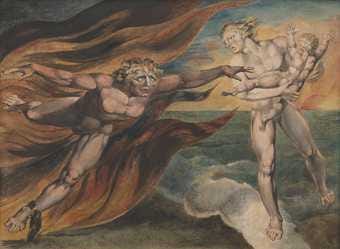
In his book Jerusalem, Blake famously wrote 'I must create a system, or be enslav'd by another man's. I will not reason & compare: my business is to create.' So while other poets might be content to use characters from the Bible, or from Greek and Roman myth, Blake created his own mythology populated by a host of beings that he himself had either invented, or re-interpreted.
Find out more about the characters that appear often in Blake's work.
ALBION
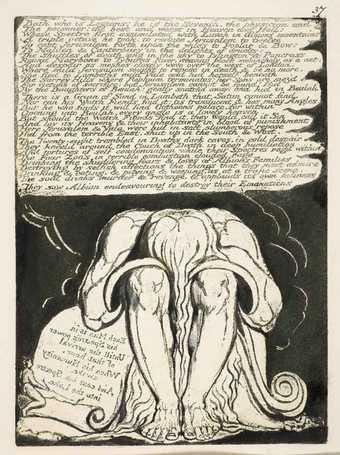
This picture, the thirty-seventh plate of Jerusalem, shows Albion in despair. Albion is a poetic name for England. Taken from the Latin adjective ‘albus’ (white) it refers to the white cliffs of Dover.
Albion is occasionally presented as joyful figure, but he is most often depicted sleeping, suffering or in despair. In Blake's book Milton, Albion is asleep, ‘heavy and dull’ until Blake and Milton awaken his revolutionary fervour, while Jerusalem tells the story of the regeneration of Albion from harshness and cruelty.
ENITHARMON
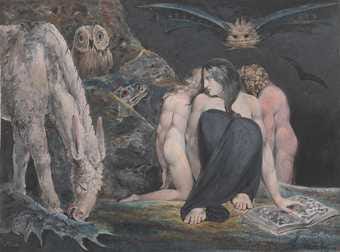
Enitharmon is an important female character in Blake’s mythology, playing a main part in some of his prophetic books. She is the Emanation of Los, and with Los gives birth to various children, including Orc.
Although symbolising spiritual beauty and poetic inspiration (some critics have argued that Blake’s wife Catherine was the inspiration for the character) she is also used by Blake to represent female domination and sexual restraints that limit the artistic imagination. The bulk of Europe a Prophecy is devoted to Enitharmon’s domination of the material world and puts forward various sexual rules through religion which Blake describes as errors found in orthodox Christianity.
The name ‘Enitharmon’ could be a derivation of (z)enit(h)-harmon(y). It has also been suggested that the Greek anarithmon or ‘numberless’ is another possible starting point for the name.
THE GHOST OF A FLEA
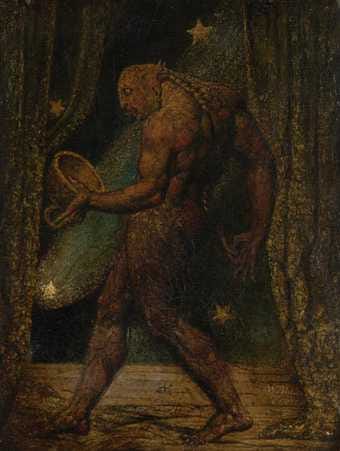
John Varley was a watercolourist, landscape designer and astrologer whom Blake met towards the end of his life. Varley encouraged Blake to sketch portraits of the people who populated his visions, and in all there are between forty or fifty drawings of these characters. Many of these depict historical characters, like kings and queens, but the most popular has always been the flea, which exists both as a simple sketch and as this elaborate painting.
According to Blake, the story goes that fleas were inhabited by the souls of bloodthirsty men. These bloodthirsty men were confined to the bodies of small insects, because if they were the size of horses, they would drink so much blood that most of the country would be depopulated. The flea’s bloodthirsty nature can be seen in its tongue, darting from its mouth, and the cup (for blood-drinking) that it is carrying.
The poor quality of this picture is due to Blake painting it in what he called ‘fresco’ (tempera), which has cracked and dulled with age. The influence of Michelangelo (1475–1564), a Renaissance artist whom Blake admired, can be seen in the highly defined musculature of the flea’s burly body.
LOS

This picture, the 100th and final plate from Jerusalem, shows Los (the middle figure) in the pose of the Apollo Belvedere. He is holding a hammer in his right hand, and a pair of tongs in his left.
In Blake’s mythology Los represents the imagination, and corresponds to the loving and forgiving Christ of the New Testament. (As opposed to Urizen who, according to Blake, is the vengeful and repressive God of the Old Testament). Los often appears as a blacksmith with the tools of his trade. Blake sees Los crafting objects from molten metal, as he himself forged his visions and inspirations into poetry and art.
The name ‘Los’ may derive from the word ‘loss’, alluding to fallen man’s having ‘lost’ Paradise. It may, however, be a reversal of the Latin word ‘Sol’ (sun), since Los is shown creating the sun on plate 73 of Jerusalem. On the right of the picture is Enitharmon, Los’s wife. To Blake, she represents misguided religion based on chastity and vengeance. Their child is Orc, the symbol of revolution.
NEBUCHADNEZZAR
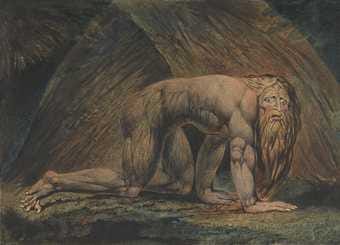
Nebuchanezzar was the King of Babylon whose arrogance was punished by God. This is how he is described in the Old Testament’s Book of Daniel:
He was driven from among men, and ate grass like an ox. And his body was wet with the dew of heaven, till his hair grew as long as eagles’ feathers, and his nails were like birds’ claws
Here we see him in exile, animal-like on all fours. Naked, he gazes with horror at his own reflection. This picture was painted in 1795, two years after the execution of Louis XVI in France. Meanwhile in England, George III, whose control the American colonists had recently thrown off, suffered from bouts of insanity. Could this picture of a degraded king be an expression of Blake’s sympathy for the republicans in France and America?
NEWTON
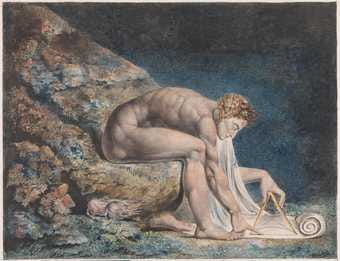
The eighteenth-century poet, Alexander Pope, wrote a satirical epitaph for Newton:
Nature and Nature’s laws lay hid in night
God said Let Newton be! And all was light.
This shows just how much the eighteenth century revered the great philosopher. Newton had successfully explained the workings of the physical universe. To Blake, however, this was not enough: Newton had omitted God, as well as all those significant emotional and spiritual elements which cannot be quantified, from his theories. Blake boasted that he had ‘fourfold vision’ while Newton with his ‘single vision’ was as good as asleep. To Blake, figures like Newton, Bacon and Locke with their emphasis on reason were nothing more than ‘the three great teachers of atheism, or Satan’s Doctrine.’
In this print from 1795 Newton is portrayed drawing with a pair of compasses. Compasses were a traditional symbol of God, ‘architect of the universe’, but notice how the picture progresses from brightness and colour on the left, to sterility and blackness on the right. In Blake’s view Newton brings not light, but night.
OOTHOON
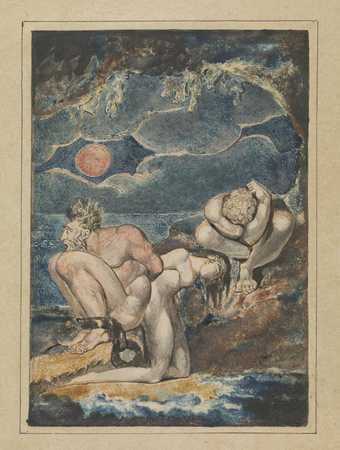
This picture is the frontispiece of Visions of the Daughters of Albion. It shows (from right to left) Bromion, Oothoon and Theotormon.
Bromion (whose name means ‘roar’ or ‘inarticulate sound’ in Greek) has raped Oothoon, but they are now bound back to back. Oothoon represents both innocent sexuality and the political freedom. She is in love with Theotormon who returns her love, but is unable to act, considering her ruined. In the picture he is literally bending himself into knots of indecision. His name derives from ‘theo’ (god) and ‘torment’ or ‘torah’ (Hebrew law), and he represents man tortured by the restrictions of conventional morality.
In this poem the Daughters of Albion are a species of chorus who do little more than ‘weep’ and ‘sigh towards America.' They represent monarchy-oppressed Britain’s yearning for liberty. The doomed love scenario of Oothoon and Theotormon may derive from a book that Blake was illustrating at this time, about the adventures of an English captain who had experienced an ill-fated passion for a slave in the South American colony of Dutch Guiana.
ORC
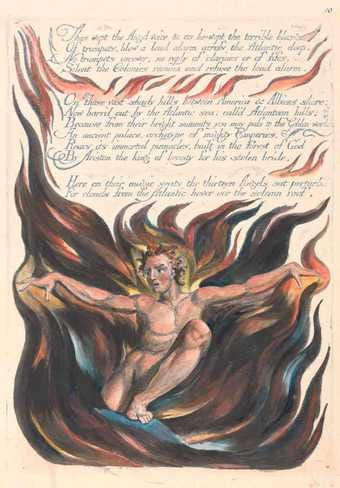
In America: A Prophecy, Orc is described as ‘Lover of Wild Rebellion, and transgressor of God’s Law.’ He symbolises the spirit of rebellion and the love of freedom which provoked the American War of Independence and the French Revolution.
Orc appears in four of Blake’s prophetic books: America, Europe, The Book of Urizen and The Four Zoas. In contrast to Urizen, a bearded old man who represents law and repression, Orc is a vigorous youth, surrounded by the fires of revolutionary passion and unrepressed lust. The scholar Foster Damon believes that the name Orc derives either from Cor (the Latin word for heart), or from Orca, meaning ‘whale.’
URIZEN
https://en.wikipedia.org/wiki/Cenodoxus
Last rites[edit]
When the dead body of Cenodoxus was taken to the cathedral and prepared for its last rites—namely, a blessing in the nature of a viaticum—and it was laid out on the stone table there, it managed to cry out three times in three days, each time prompted by the priest saying his name, and each time leading to an ever-larger crowd of onlookers to witness what was happening.
No sooner had the priest begun to perform his last rites, and started to say "Cenodoxus" than the corpse jolted, opened its mouth, and—moving its dead lips—cried out to interrupt the services. Each time this happened, the priest considered it to be a bad omen, and delayed the man's last rites by an extra day.
On the 1st day, the Priest said, "Cenodoxus was a good man," and it cried out, "I have been accused."
On the 2nd day, the Priest said, "Cenodoxus was a good man," and it cried out, "I have been found guilty"
On the 3rd day, the Priest said, "Cenodoxus was a good man," and it cried out, "Oh, My God, My God, My God, I have been damned to Hell Eternal."
Jacob Bidermann's poetic account of this passage is written in Latin verse, following a perfect iambic meter.
The onlookers witnessing this event were dumbfounded, as they could not think of anything Cenodoxus had done warranting damnation. He was not known for swearing, cheating, or coveting. He was not a gambler, but was in fact so generous with everything he had, that he had nothing when he died. They did not understand why Cenodoxus would have cried out the things that he did.
Exegesis Hermeneutics Flux Capacitor of Truthiness
Toggle Sidebar
March 10, 2019
THE MONEY LENDERS,(PART 1) HERODS EXTENSION, EXTEND AND PRETEND. THE TYRIAN SHEKEL, PETRO DOLLAR FROM HEROD TO NETANYAHU. THE IDES OF MARCH, TURKEY FOR EASTER?
In Part 1 we look at the sweep of dominant narratives built upon 2000 years of the Judaeo Christian Tradition and contrast it to the Orthodoxy of Abrahamic verbal Torah tradition.
The Tower of Babel with knobs on in part 2 as we look at the phenomenon of Chinese whispers, divide and rule merchants of doubt and spreading facts irresponsibly.
From Me to a freind by E-Mail
Oct 6, 2018, 9:46 AM
The Alternative media as with the MSM has become a place of repeated theory and the Audience is becoming static and infected with groupthink. Ryan should write a Book and do a book tour, he is a clever guy although I sense he is frustrated that more people do not give him accolades.
Social Media is a consumer of self-worth and manufacturer of fragile EGO, narcissism, and delusion. There is a Welsh bloke who regularly interviews Paul Craig Roberts, the Welsh bloke spends most of his questions blowing smoke up PCRś arse. A remarkable thing about James Corbett ( also based in Japan) is how fresh he keeps his work and even with James, I can’t stomach watching the regular segment he was chatting with some other guy for an inordinate length of time.
The Musk Letter from Greenlight is pretty solid I am sure. The Management of Expectations in the tech market is not something that anyone has got the hang of and anyone that does is fired for being a Cassandra. Things are complicated in that as with Solar, Wind and Energy storage technologies there is real progress but also the reality that The existing paradigm cannot be ditched anytime soon and is, in fact, part of the solution and not the problem which the new technologies are solving.
I think the problem is one of not only expectations but also of spinning what the PR people hope will be self-fulfilling prophecies, the Rove type Actors in History idea. In itself, the Actors in history idea is just a variation of Hans Christian Andersons “Emperor’s new clothes “
If we are headed for a Repeat of 2008/9 and a new Lehmans moment Mike ? where will the preferred Scapegoats come from? Musk would be more like another Enron than another Lehmans? Theresa May blamed New Labour and Profligacy in public spending for the 2008/9 crisis in here Speech at the Tory conference, The Austerity Narrative is still very raw and how much of the current economic malaise on main street be laid at the door of Austerity and too much of newly created debt-based money going into pumping up the financialised economy?
Tesla is a small part of a bigger picture, what the real budget is to get the show back on the road rests in the availability of Energy and Resources which are properly directed to areas of real market need as opposed to artificially created Market wants? This is obscured by the nonsense narratives of Money as a scarce resource. I suspect that Bezos ( Amazon) and Zuckerberg ( Facebook) UBER possibly, may be in the crosshairs for scapegoating as well. Personally, I would be looking at the Hedge Funds/Private equity funds which are in fact just a new front for what we used to call Merchant Banks, Black Rock and the long list of familiar names in the MEGA m&A action are where I think the Crosshairs should be trained but, I suspect that yet again the next crisis will see Banks getting away with it and ending up with the Jewels in the pile of shit, one of which in all likelihood will end up being Tesla,
https://therealdeal.com/2017/11/06/banks-are-far-more-exposed-to-risky-real-estate-loans-than-you-think-thanks-to-this-loophole/ This article has stood out in my mind from what I have read over the past month
https://off-guardian.org/2018/12/30/to-whom-was-her-majesty-referring-in-her-christmas-broadcast/
Dr Michael Hundson, author of a new book, ‘… and forgive them their debts’, about the history of debt forgiveness. Hudson explains that the rulers of Byzantium wiped out the savings of rich people by forgiving debts because cancelling debts does not cause economic crises but prevents them. He explained that the Bronze Age Babylonians had worked out the mathematics of this. Compound interest grows exponentially, whereas productivity can only grow linearly, and so whatever the interest rate, national debt will eventually outstrip productivity. Forgiving debt seems to me to be rough justice for the individual, but the rulers weren’t so interested in the individual; they were interested in keeping the economy going, and having a stock of fit young people for their wars. I’ve got the book on order, but in the meantime I’ve been looking at a review of the topic, written in 2012, which makes reference to the work of Michael Hudson, titled, ‘The long tradition of debt cancellation in Mesopotamia and Egypt from the 3rd to the 1st millennium BC JC’.
Economist and author, Michael Hudson, in his new book “…And Forgive Them Their Debts: Lending, Foreclosure and Redemption From Bronze Age Finance to the Jubilee Year,” shares with journalist Chris Hedges how Ancient cultures forgave debt cyclically to prevent debt peonage and the rise of an oligarch elite.
Note Ed…. Add Transcript word tag cloud and link to all reviewed speakers corner videos- New Video on Second Temple Extension, Roman Vassal under Herod to Jewish Revolt. And Jewish Revolt to Council of Nicea, Pelagian and Aryan heresies, Anathema and the Story of the King James Bible Latin Vulgaris, Maimonides to John Tynesdale.
“THEY WOULD NOT DANCE AND THEY WOULD NOT FOLLOW ME”
My Thesis in this Post is that Religious Orthodoxy, as opposed to Religious conformism, are two separate things and Orthodox traditions have more to agree upon than Conformist traditions.
I use conformist in the sense of Conforming to the Strictures of a Branch or school of thought within an over arching religious/State/Political Structure.
I have been struck by the themes of Orthodox beginnings lapsing into king-making and idolatry, King Making and breaking into Iconoclasm and from there to orthodoxy refreshed.
Abraham, Moses, Jesus and Mohammad all suggest a refreshing of Orthodoxy back to the Simple word of god as Truth and Love it is later figures who then weave spells with words and concepts which seek to usurp what human beings have in their hearts and minds given as truth from being at one with the Creation, and the Creator, if you have a Religious Faith.
https://theconquestofdough.weebly.com/on-the-chronology-of-human-society.html
Timeline from here. http://www.israel-a-history-of.com/old-testament-timeline.html#gallery[pageGallery]/2/ For Chronology of The Dough, Conquest of Dough, Shewbread and the Garmo family.
https://theconquestofdough.weebly.com/a-journey-mapped-from-then-to-now.html
1


